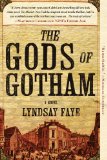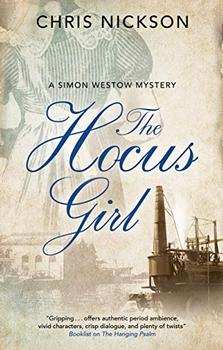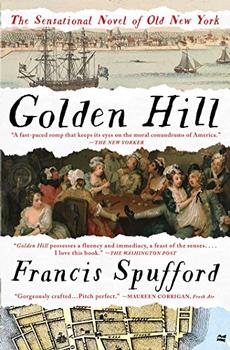Summary | Excerpt | Reading Guide | Reviews | Beyond the book | Read-Alikes | Genres & Themes | Author Bio

A Novel
by Lyndsay FayeLyndsay Faye's novel, The Gods of Gotham, is an excellent historical mystery set in a time and place not many fiction writers have ventured to date: New York City, circa 1845. On the surface, the year seems unremarkable - James Polk is President, and the American Civil War has yet to occur. However, Faye manages to capture the setting brilliantly, breathing life into the era, making it interesting and relevant to modern readers. She provides real insight into the tensions that permeated New York City during that period.
The mystery upon which the book is predicated is outstanding - well-reasoned and exceptionally complex. After a fire ravages Lower Manhattan, Timothy Wilde joins the newly-formed New York Police Department and, upon encountering a young girl covered in blood, finds himself on the trail of a killer. The author has constructed an intricate, entertaining puzzle that will keep readers guessing until the very end of the novel, and once the main character has figured out "whodunit," the story continues until all twists have been unraveled and loose ends tied up. The conclusion is satisfying and makes sense in every way, and Faye leaves ample room for a sequel without allowing those openings to feel too contrived.
The historical elements of The Gods of Gotham work equally well. The novel is obviously well-researched, particularly the culture clash between the city's founders (predominantly British Protestants) and the rapidly growing freed black and Irish Catholic immigrant populations. Faye also weaves in information about the all-important politics of the day, adeptly illustrating the influence of the Tammany Hall political machine that was gaining power. The author's attention to detail is evident.
Faye's characterizations are also extraordinary. Her main character, Timothy Wilde, has the potential to become a literary staple ala Hercule Poirot or Adam Dalgliesh. He's a brilliant creation: smart, observant, brave, and someone who fights for the underdog, yet he's damaged and has a lot of emotional baggage. He's intelligent and talented without being arrogant, and altogether a very likeable young man. The character has clearly been inspired by Sir Arthur Conan Doyle's Sherlock Holmes, but Wilde's edges are softer, making him more human and fallible but without crossing the line into caricature or cartoon. Additionally - and perhaps more challenging for an author to accomplish - he continues to grow over the course of the novel. This is what makes Wilde such a compelling protagonist.
In truth, I'd be hard-pressed to name a character in The Gods of Gotham that wasn't well-developed, as Faye has imbued even minor characters with tons of personality. She also does a particularly good job with the children she portrays. They come across as worldly yet vulnerable, and not overly precocious. It's a difficult balance to achieve, but the author manages it perfectly. Constables, bakers, doctors, clergy, petty crooks - all fully fleshed-out and unexpectedly "real."
The Gods of Gotham is the first book in a series that will feature Timothy Wilde, and I'm eagerly looking forward to the next installment. Faye's first novel, Dust and Shadow, pitted Sherlock Holmes against Jack the Ripper. Gods of Gotham, her second novel, is sure to win her many new fans, as it will certainly appeal to historical fiction aficionados as well as those who enjoy well-written mysteries.
Additional Information
New York City is popularly referred to by the nickname "Gotham City." The title was popularized by Bill Finger, the writer of the Batman comic books, starting in 1939, but the term originated much earlier. Washington Irving first used the sobriquet to refer to New York City in the November 11, 1807 issue of Salmagundi, a journal that satirized New York politics and culture. Irving borrowed the name from Gotham, a village in Nottinghamshire, England that was purportedly "inhabited by fools." According to the Online Etymology Dictionary, the village was originally called Gatham (1086), which meant "[an] enclosure (lit. 'homestead') where goats are kept."
![]() This review was originally published in The BookBrowse Review in April 2012, and has been updated for the
March 2013 edition.
Click here to go to this issue.
This review was originally published in The BookBrowse Review in April 2012, and has been updated for the
March 2013 edition.
Click here to go to this issue.

If you liked The Gods of Gotham, try these:

by Chris Nickson
Published 2020
Thief-taker Simon Westow must save one of his closest friends from a grim fate at the hands of the government in this compelling historical mystery.

by Francis Spufford
Published 2018
Winner of the 2017 Costa First Novel Award.
The spectacular first novel from acclaimed nonfiction author Francis Spufford follows the adventures of a mysterious young man in mid-eighteenth century Manhattan, thirty years before the American Revolution, in "a first-class period entertainment" (The Guardian).
Your guide toexceptional books
BookBrowse seeks out and recommends the best in contemporary fiction and nonfiction—books that not only engage and entertain but also deepen our understanding of ourselves and the world around us.